Healthcare app development solutions are rising in demand at a meteoric level. So much so that a survey by Statista indicates that there will be 86.3 million health/fitness app users in the United States by the end of 2022.
In essence, healthcare apps are digital products that provide health-related services through Android, iOS, Windows, or macOS devices. These applications are thriving due to the ease, affordability, and accessibility they offer to the medical industry. As a result, a range of well-developed healthcare apps like Doctor On Demand and MyChart have emerged in the market for simplifying digital healthcare solutions for doctors, nurses, patients, and medical staff.
When done right, creating a comprehensive healthcare solution through mobile applications can help maintain and improve the health of many patients, while preventing doctor’s burnout. You can go through every section in this article to understand how healthcare iOS and Android app development works. But before we start with the stages, let us recount some of the advantages that come associated with healthcare applications.
Healthcare App Benefits
Medical app development is in demand due to how well those apps can meet the requirements of patients and doctors. There are a number of benefits that back this massive demand for the two critical stakeholders of the sector.
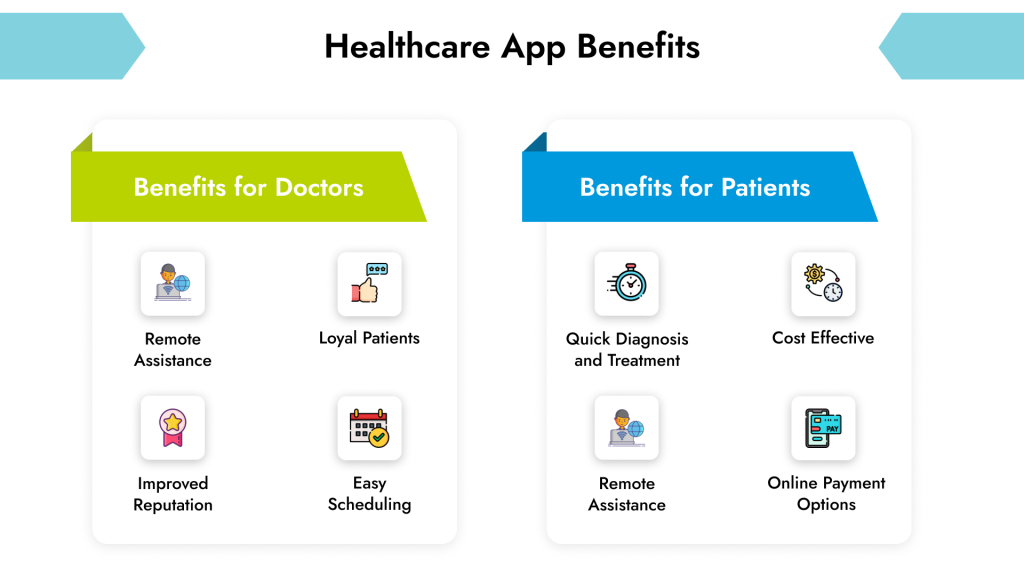
Benefits for Doctors
Doctors will be more likely to prefer your app if it gives them an easy way to gain the trust of patients.
Remote Assistance
Doctors can diagnose patients and provide medical assistance remotely no matter where they are, where the patient is, or what time of the day it is at either location. They can consult them through calls, video calls, and chats based on how you develop your healthcare app.
Loyal Patients
Doctors providing remote healthcare to patients can gain multiple loyal patients. These patients will always contact the same doctor for medical care due to their easy availability through the app.
Improved Reputation
Doctors can improve their reputation in the healthcare industry by providing remote diagnosis, treatment, and prescription through the app. More and more patients will turn to remote healthcare for minor health conditions, and doctors with better reputations will thrive on such apps.
Easy Scheduling
Scheduling, rescheduling, and canceling appointments become easy one-click tasks for doctors with healthcare app accounts.
Benefits for Patients
The primary user base of your app will depend on the number and type of benefits you provide for patients.
Quick Diagnosis and Treatment
Healthcare applications include video calls and chats that help patients have transparent conversations with doctors. It helps them get a proper diagnosis and quick treatment suggestions remotely.
Cost Effective
Online appointments are always less expensive for patients than in-person consultations at the clinic.
Remote Assistance
Patients can get medical assistance from their doctor no matter where they are on the planet. It proves extremely helpful during emergencies and for health conditions requiring a specific doctor who knows the patients and their medical history.
Online Payment Options
Patients can quickly make online payments through the app for consultations, scheduling appointments, and medicines.
Types of Healthcare Apps
Some healthcare applications are specially designed for doctors, while others are for patients and the medical staff. Let us look into both app categories.
- Professional Health Applications
- Applications for Patients
Professional Health Applications
Professional health applications are like an intermediary between the patient and the doctor for remote diagnosis and treatment.
Patient Health Monitoring App
These apps help doctors/healthcare professionals monitor the condition and progress of their patients. They collect and store patient health records like test reports, prescribed medicines, medical history, and real-time updates on patient health.
Including an AI in a patient health monitoring app can help ensure that the app provides accurate information about a patient as and when needed.
Medical Professional Networking
These apps are a platform for healthcare professionals/doctors where they can exchange information/notes, ask and answer questions, get second opinions, and conduct medical research as a group. Features can include chat, call, video call, and sharing documents, videos, and patient records with patient details hidden.
Healthcare Database
This app provides descriptive information on medical conditions, diseases, medicine, medical research, prescription, and patients. For example, the app could have data on the symptoms of multiple diseases or precautions to prevent them. Such information can prove helpful to doctors by helping them stay up to date on new developments in the healthcare industry.
Doctor on-Demand
Doctor on-demand apps are essentially telemedicine or telehealth apps. They deliver remote healthcare services via online consultation and are great for medical emergencies. Building a telemedicine app is a lucrative decision in the current market. An expert prediction states that the telemedicine market value will reach 460 billion USD by 2030 compared to 70.4 billion in 2021.
Doctor Appointment
Doctors and patients can use these apps to schedule appointments, change schedules, notify patients and doctors about future checkups, and keep track of all medical information.
Healthcare Applications for Patients
These apps provide patients with important information about their health and access to digital healthcare.
Health Monitoring Apps
Patients with health conditions like diabetes and asthma can use these applications to keep track of their symptoms and take the necessary precautions. These apps can also help end users keep track of their diet, exercise, and sleep cycle, enabling them to take charge of their wellness.
Patient Health Education
These applications provide regular users information about usual health conditions, diseases, how to avoid diseases, symptoms, and new developments in medical treatments.
Reminder
These apps can remind patients to take medicines on time, get rest, visit the doctor, and follow build healthy habits.
Mental Wellbeing
These apps provide information and tutorials around mental wellbeing through meditation, stress reduction techniques, self-care tips, and sleep management.
Fitness and Weight Loss
Fitness and weight loss apps include information and guides for muscle growth, yoga, and weight loss. According to a survey by Statista, there will be 86.3 million fitness app users in the US by the end of 2022.
How to Create a Health App in 10 Steps?
Building a feature-rich healthcare application can be difficult. Get the assistance of a medical mobile app development company to plan, conduct, and manage every development stage effectively. They will help create a medical app that provides something unique and of value to target users.
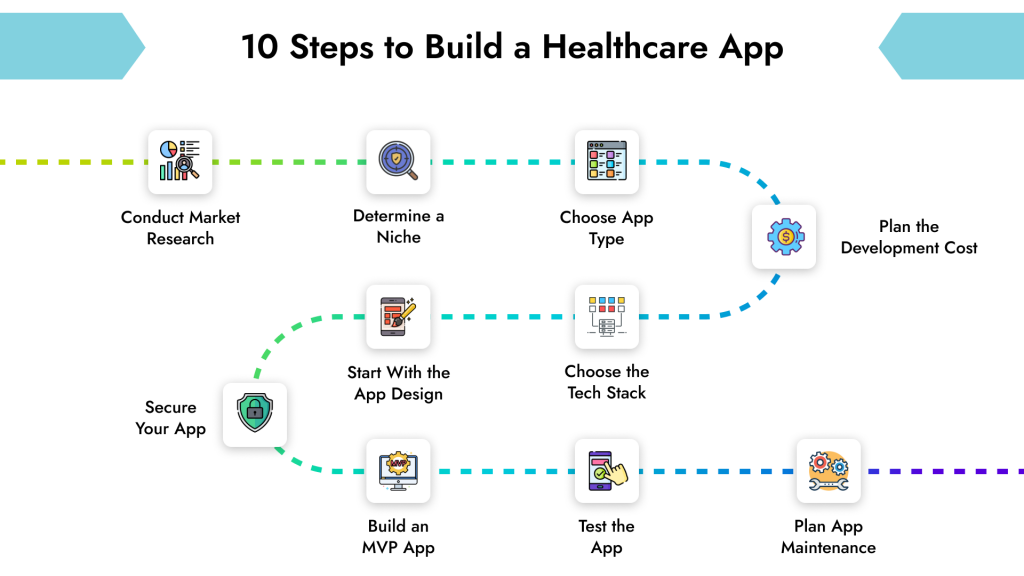
Step 1: Conduct Market Research
Market research involves studying competitors, target audiences, and demand for healthcare apps. You will need to examine the development strategies, features, and app design that made your competitors successful. Moreover, it would help to conduct surveys and interviews of the target audience to determine how you can make your app stand out.
Hiring an offshore development company is the best way to manage a process like this. They have a great understanding of the app market and can develop an app for a local and global user base.
Step 2: Determine a Niche
Choosing a niche for your healthcare will be easier if you conduct market research well. You should already know your app niche if you are building the app for your own healthcare institution. However, make sure the app niche you choose has the potential to make an impact on the target users. For example, while a healthcare app that connects doctors and patients simplifies healthcare, when you add online buying options for the medicine prescribed by the doctor is even more helpful.
You can always start with a single niche that would help most target users and update the app with additional services/products once the app gains a decent user base.
Step 3: Choose App Type
Cross-platform apps are a good choice if you have a tight budget and goal that requires the app to serve a large user base. You can create a cross-platform healthcare app for Android, iOS, and Windows/macOS users. Native, Hybrid, Web, Cross-platform, and Progressive Web apps are all your options for this mode. However, it is critical to know the benefits and weak points to understand which one is best for your requirements. For example, native is best if high performance is essential for your healthcare app but cross-platform is ideal for quick app launch with basic experiences.
Consult with healthcare mobile app developers and choose a type that serves your requirements, budget, and target users.
Step 4: Plan the Development Cost
The MVP version of healthcare app development can cost somewhere between $20,000 to $40,000. However, your app type, platform, types, and number of features, and design requirements will determine the final cost of healthcare mobile app development.
To get a high-level idea, you can refer to the table to get an average estimate of healthcare app development costs.
Cost to Develop a Healthcare App
| Android | iOS |
| $20,000 to $40,000 | $25,000 to $40,000 |
| $45,000 to $75,000 | $45,000 to $80,000 |
| $150,000 to 250,000 | $150,000 to 250,000 |
Step 5: Choose the Tech Stack
Professional developers can help choose the most suitable tech stack as they are essential for the reliable functionality of your app. Consider a widely used tech stack for the frontend, backend, payment gateways, database, and notifications. It is easy to verify the reliability of such technology in development. Take a look at the list below to know which tech stack you may need for your app:
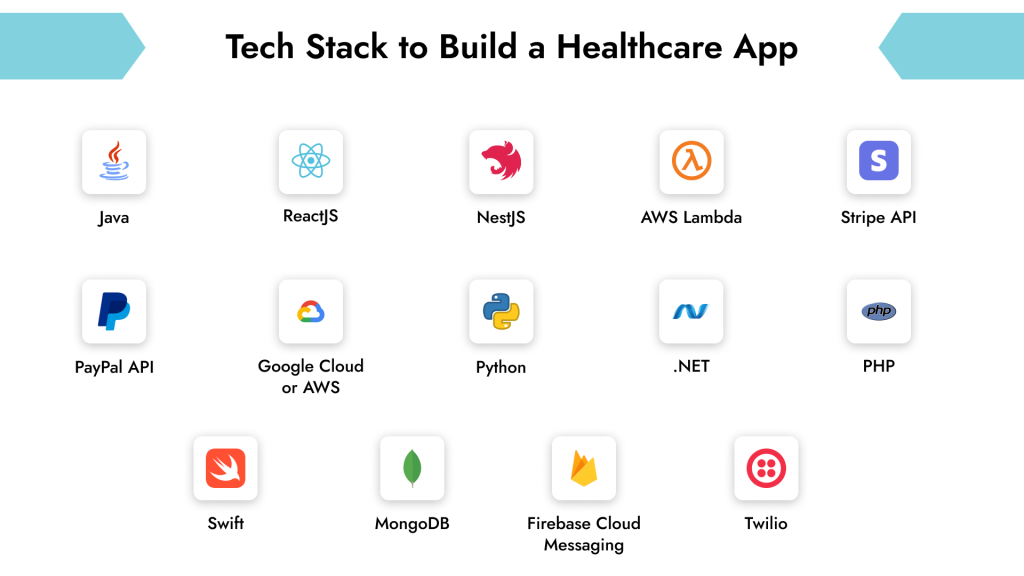
Step 6: Start with the App Design
Focus your effort and budget on the app design from the early days of development. App design can capture and maintain the interest of target users, making the first impression of your app. Understand everything you can about the User Interface (UI) and Experience (UX) in a healthcare mobile app. Verify the portfolio of designers to ensure you hire the right ones for your project requirements.
Take a look at the type of design your competitors use to figure out a better alternative that can increase user retention for your app. Ultimately, your app design must be elegant and easily navigable to make every step convenient for users.
Step 7: Secure Your App
Healthcare applications store delicate information like patient health records, contact details, addresses, payment information, medical research, confident conversations, and doctor/staff details. Such information will require reliable security if you want users to trust your app.
Pay attention to risk identification, mitigation, data encryption, and standards associated with healthcare data collection and storage.
You can also use cloud computing to provide better scalability and security for your app. It will help you keep it in accordance with the legal standards required for a healthcare app. Every country, and region can have different regulations or laws to protect healthcare information thus it’ll be best to consult with a healthcare iOS and Android app development company to make this process easy for your app.
Step 8: Build an MVP App
Creating an MVP to monitor the healthcare app’s early performance is a great way to enter the market. The minimum viable product helps monitor product usability, feasibility, and market demand. It reveals what you did right and wrong during development and helps perfect the advanced version of your app.
You can hire an offshore app development company for an MVP app to shorten the development timeline and budget. This, in turn, will give you more financial freedom to get creative once your MVP app succeeds. Following this, you can add advanced versions according to your business requirements.
Step 9: Test the App
Test your healthcare app to confirm that its data presentation, navigability, overall functionality, and design meet the market expectations. The testing process should also involve the target users of healthcare apps that can give you end-user feedback. It will help you identify the strengths and weaknesses of your app.
Frequent testing and quality assurance help confirm the good functionality of your app. Ensure that your testers and QA engineers have verifiable portfolios and an informative understanding of the healthcare industry, after all, your app will be ready for launch once the testers and QA engineers approve it for use by end users.
Step 10: Plan App Maintenance
App maintenance is something you need to plan from the early days of development. Your app needs maintenance to deal with or prevent bugs, crashes, and inconvenient downtimes. Healthcare apps will involve many complex operations that can cause unexpected crashes without regular maintenance.
App crashes and downtimes lead to customer defections and benefit your competitors. Moreover, they can ruin the user experience of your app for many users. You must ensure uninterrupted and user-centric app performance to gain a loyal customer base.
Must-have Features for a Healthcare Mobile App
Building a health app will be less complicated if you only focus on adding the core feature of a healthcare app in the beginning. You can update the app with advanced and new features once it succeeds in the market. Let us look into some MVP features of a healthcare application.
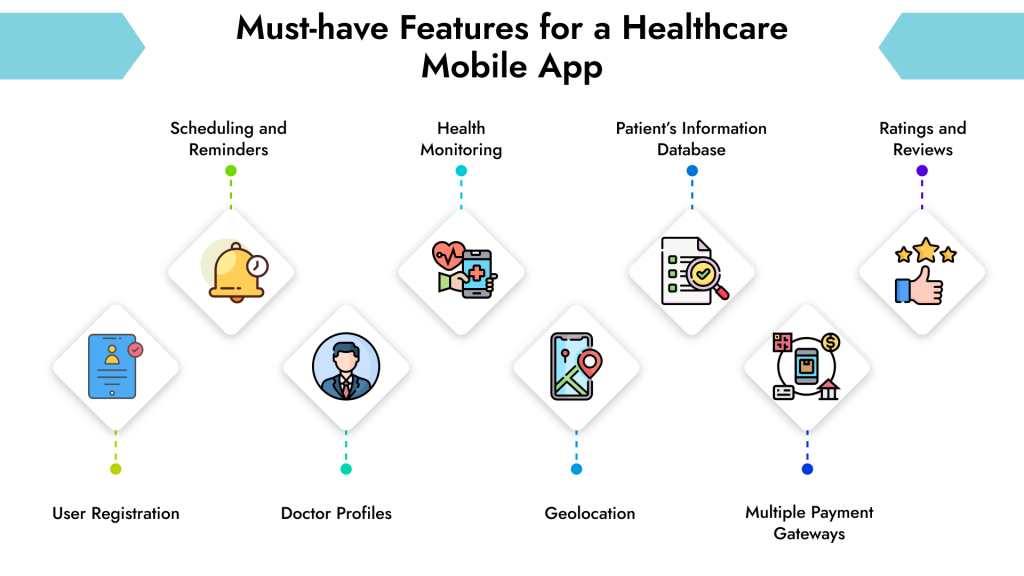
User Registration
Patients and doctors must be able to sign up/sign in with their email IDs, phone number, or through multi-factor authentication.
Scheduling and Reminders
Doctors and patients can manage appointment scheduling with this feature. The app will notify both parties about the appointments through frequent reminders. It can also be used for reminding patients about tasks like taking medicine, sleeping schedules, and meeting daily calorie goals.
Doctor Profiles
Doctor profiles help doctors add their specialization, availability, location, and rates for the patient to view and compare with the profiles of other doctors.
Health Monitoring
This feature helps doctors and patients monitor factors like blood pressure, heart rate, calorie consumption, and sugar levels.
Geolocation
This feature helps patients find the nearest clinics to their location and its advanced version can provide doctors/patients real-time directions to the patient or hospital locations.
Patient’s Information Database
Patients and doctors can save and access medical histories, prescriptions, and medical reports in a secure patient database.
Multiple Payment Gateways
Your healthcare app must have multiple payment gateways like bank cards, credit cards, PayPal, and Stripe to make payments easier for all users.
Ratings and Reviews
Patients can provide feedback on doctors and app services through ratings and reviews. It will help patients choose the right doctor by being able to avoid ineffective ones.
Final Note
Analyzing your business requirements and market expectations should help you build a healthcare app that can succeed and survive its competitors. Addressing the growing need for efficient, user-friendly, and secure medical apps can provide advantages your app will need to make an impact. All you need to do is get a capable mobile app development company like us to work on the development project.
Whether your niche is focused on physical, emotional, or mental health (or all in one), our team can plan and execute any app development project related to healthcare. We focus on data encryption and security to protect all sensitive information about patients. Our experts assess the healthcare market in accordance with your business requirements to build a unique app. Request a free estimate for your app now and get the project started right away.
Frequently Asked Questions
The average cost to develop a healthcare app ranges from $25,000 to $45,000. It all depends on your app features and design requirements.
A good health app should be user-friendly, have a quick load time, offer content that provides value to the user and have top-notch data security. For example, a fitness app should have insightful information about muscle growth, weight loss, healthy diet, yoga, and a feature to contact trainers and nutritionists.
Conduct thorough market research on the healthcare industry to know what your competitors are offering, what your target audience wants, and which factors will make your healthcare app unique from the rest. It will help you determine what you need to put in your health app.
The duration of healthcare app development depends on app types, feature and design requirements, platforms, and app development strategy. The average app development duration ranges from 4 to 6 months.














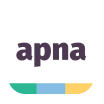

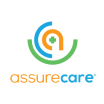
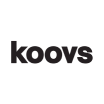
.png)
.png)
.png)



Excellent to be visiting your blog again, it has been months for me. Rightly, this article that I’ve been served for therefore long. I want this article to finish my assignment within the faculty, and it has the same topic together with your article. Thanks for the ton of valuable help, nice share.